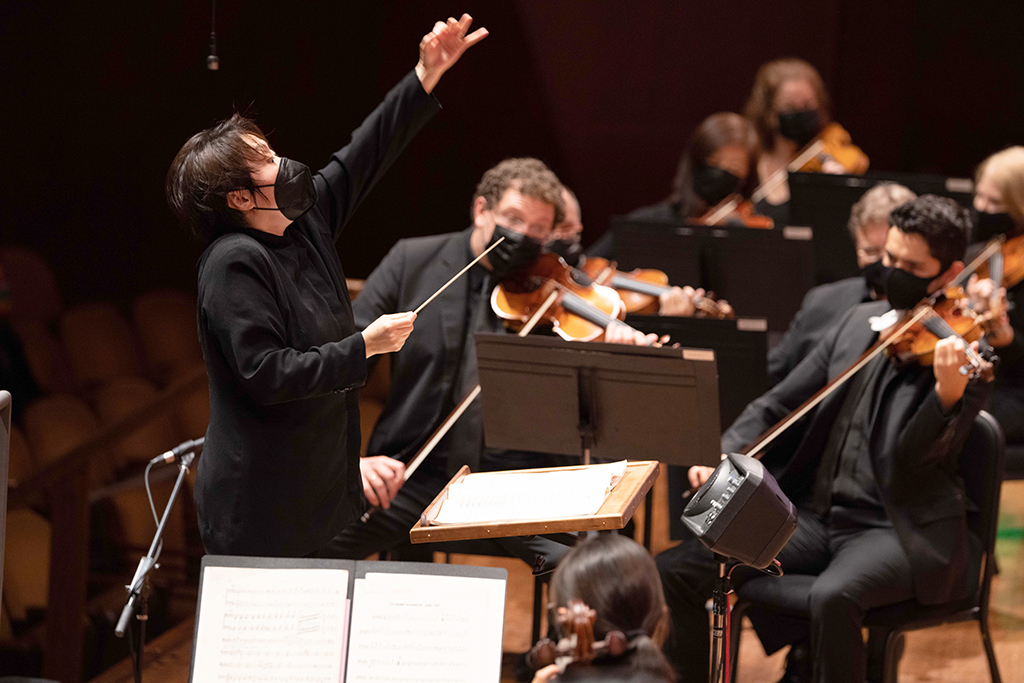By Andrew Hamlin
NORTHWEST ASIAN WEEKLY

2021/2022 season Open House Concert at Benaroya Hall on September 19, 2021, featuring guest conductor Xian Zhang. (Photos Credit: Nick Klein)
Xian Zhang’s Wikipedia page indicates that she started studying classical music with her mother, learning on a piano her father hand-built.
But the Chinese American classical conductor, guesting at the Seattle Symphony in late March and early April, allowed, with one of her warm laughs, that the truth’s a little more complicated.
“The real story is that my mother started me on, you know those mini-organs that you have to pedal to make the sound out of it? Like the size of a celesta? My mother got me one of those when I was 3.
“A little while after I started, they realized they needed to get a real piano. That’s when they discovered that there’s no piano nearby, no way to buy it, nothing available.”
Her father was a luthier, turning out hand-made cellos and guitars. But the next instrument in his daughter’s musical education was the only piano he ever built—a piano shell, that is.
Continued Zhang, “At the time I was born, in the 1970s, all the Western instruments were burned, during the Cultural Revolution. Western instruments were against the rule. So he found some parts from a piano factory that was closed down. He built the shell and painted it a very dark red. They still have it, now, in China.”
Did taking music lessons from her mother make her nervous?
“No, no! They were very strict with me, but I think I liked it. Otherwise I would have rebelled or something. I never complained about the music part. The discipline, sometimes, was a little too harsh. But it’s worth the effort.” And she laughed again.
Zhang graduated from Beijing’s prestigious Central Conservatory of Music. She studied conducting from age 16, and made her public debut at 19, leading the China National Opera Orchestra in Mozart’s opera, “The Marriage of Figaro.”
“Most of the professors,” she recalled, “went to school in Moscow. I find their fundamental training for, say, scoring, and conducting technique, these cornerstones have been very solid. That’s a big advantage that I’ve had.
“But after I left China, I’ve learned it’s really about [different] styles, interpretations. Those I gained from being overseas. Been a very long time. I came to the States in 1998.”
She’s led the New Jersey Symphony Orchestra, as head conductor since 2015, but she’s traveled widely for work. Her first guest conducting spot in Seattle came in the 2007-2008 season, and she’s conducted such pieces as the Jean Sibelius “Violin Concerto,” and Sergei Prokofiev’s score to the film “Alexander Nevsky,” presented with the film.
She heartily approves of the three pieces on the Seattle schedule, saying each one holds many challenges on its own. The program begins with Gioachino Rossini’s “William Tell Overture,” one of the most recognizable classical motifs in America, due to its association with the “Lone Ranger” Western franchise. It ends with Carl Orff’s “Carmina Burana,” a choral adaptation of medieval poems.
The middle piece, “L’Éloignement” (“Distance”), comes from the Chinese-French composer Qigang Chen, who composed it for string orchestra in 2003. Zhang related that she’s taken it “to many different orchestras. It’s always difficult for the strings to get it right. A lot of high-register passages, very exposed. And then it changes to a very rhythmical pattern. It’s based on a folk song, and the composer used this tune in a very elaborate way. It’s a challenging piece.”
After about 15 minutes over the phone, Zhang excuses herself.
East Coast concerns should keep her busy for a few more weeks, until we’re blessed with her presence once more.
Xian Zhang conducts the Seattle Symphony March 30 and April 1-2 at the S. Mark Taper Foundation Auditorium, Benaroya Hall, 200 University Street in downtown Seattle.
For prices, showtimes, and other information, visit https://www.seattlesymphony.org/en/concerttickets/calendar/2022-2023/22sub16.




